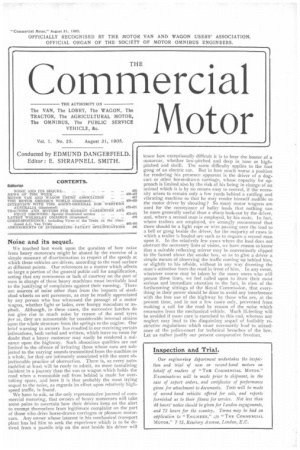Noise and its sequel.
Page 1

If you've noticed an error in this article please click here to report it so we can fix it.
We touched last week upon the question of how noise from heavy motorcars might be abated by the exercise of a simple measure of discrimination in respect of the speeds at which these vehicles are driven, according to the road surface at different points. Our references to a matter which affects so large a portion of the general public call for amplification, seeing that any remissness or lack of courtesy on the part of men in charge of these heavy machines must inevitably lead to the justifying of complaints against their running. There are sources of noise other than from the impacts of steelshod wheels on sett pavement, as may be readily appreciated by any person who has witnessed the passage of a motor wagon, whether light or laden, over bumpy macadam or asphalt. Although, in these cases, the successive lurches do not give rise to much noise by reason of the steel tyres per se, they are accountable for considerable internal strains upon the whole structure from the springs to the engine. Our brief warning to owners has resulted in our receiving certain intimations, both verbal and written, which leave no room for doubt that a heavy motorcar may easily be rendered a nuisance upon the highway. Such obnoxious qualities are not limited to the offence of irritating those whose ears are subjected to the varying sounds transmitted from the machine as a whole, for they are intimately associated with the more objectionable practice of obstruction_ There is, as every automobilist at least will be ready to admit, no more tantalising incident in a journey than the van or wagon which holds the road when a reasonable call from behind is made for overtaking space, and here it is that probably the most trying sequel to the noise, as regards its effect upon relatively highspeed traffic, is found.
We have to ask, as the only representative journal of cornmercial motoring, that owners of heavy motorcars will take some pains to ascertain how their drivers keep on the alert to exempt themselves from legitimate complaint on the part of those who drive horse-drawn carriages or pleasure motorcars. Any owner whose interest in his mechanical transport plant has led him to seek the experience which is to be derived from a 3o-mile trip on the seat beside his driver will
know how exceptionally difficult it is to hear the hooter of a motorcar, whether low-pitched and deep in tone or highpitched and shrill. The same difficulty applies to the foot gong of an electric car. But in how much worse a position For rendering his presence apparent is the driver of a dogcart or other horse-drawn carriage, whose capacity for approach is limited also by the risk of his being in charge of an animal which it is by no means easy to control, if the necessity arises to remain only a few yards behind a rattling and vibrating machine so that he may render himself audible to the motor driver by shouting? So many motor wagons are used for the conveyance of bulky loads that nothing can be more generally useful than a sharp look-out by the driver, and, where a second man is employed, by his mate. In fact, where trailers are employed, we strongly recommend that there should be a light rope or wire passing over the load to a bell or gong beside the driver, for the majority of cases in which a trailer is hauled are such as to require a second man upon it. In the relatively few cases where the load does not obstruct the necessary lines of vision, we have reason to know that a suitable reflecting mirror may be conveniently clipped to the funnel above the smoke box, so as to give a driver a simple means of observing the traffic coming up behind him, or slightly to his offside, without in any way diverting the man's attention from the road in front of him. In any event, whatever course may be taken by the many users who will peruse these lines, we feel called upon to draw their most serious and immediate attention to the fact, in view of the Forthcoming sittings of the Royal Commission, that everything in their power should be done to avoid, any interference with the free use of the highway by those who are, at the present time, and in not a few cases only, prevented from making a call for the road by reason of the noise which emanates from the mechanical vehicle. Much ill-feeling will be avoided if more care is exercised to this end, whereas any neglect may lead to the disquieting sequel of foolishly restrictive regulations which must necessarily lead to attendance at the police-court for technical breaches of the law. Let us rather justify our present comparative freedom.
























